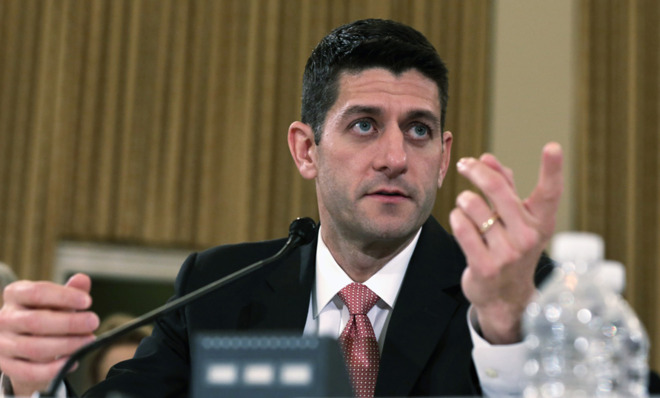Why liberals aren't buying Paul Ryan's new anti-poverty crusade
On the one hand: Ryan's stated desire to fight poverty. On the other: Every budget he's ever proposed.


A free daily email with the biggest news stories of the day – and the best features from TheWeek.com
You are now subscribed
Your newsletter sign-up was successful
Rep. Paul Ryan (R-Wis.) is known primarily for two things: Being Mitt Romney's vice presidential nominee, and proposing a number of radical budgets chock full of spending and tax cuts.
Now, though, Ryan is reportedly aiming to distance himself from Romney's failed presidential campaign, starting with the former Massachusetts governor's infamous "47 percent" remarks. He's preparing to launch a new anti-poverty plan next year in the hopes of "steering Republicans away from the angry, nativist inclinations of the Tea Party movement and toward the more inclusive vision of his mentor, the late Jack Kemp," according to The Washington Post.
But given Ryan's stated policy preferences, liberal writers and economists have met the announcement with a collective raised eyebrow and a good deal of snark.
The Week
Escape your echo chamber. Get the facts behind the news, plus analysis from multiple perspectives.

Sign up for The Week's Free Newsletters
From our morning news briefing to a weekly Good News Newsletter, get the best of The Week delivered directly to your inbox.
From our morning news briefing to a weekly Good News Newsletter, get the best of The Week delivered directly to your inbox.
Ryan has yet to offer much in the way of specifics, though the Post noted that his "idea of a war on poverty so far relies heavily on promoting volunteerism and encouraging work through existing federal programs, including the tax code." But his liberal critics were quick to point out that's a laughably insubstantial approach.
"All sizzle, no steak," economist Jared Bernstein wrote. "And is that not the story of Rep. Ryan? His is the classic example of the adage that if you've got a reputation for being an early riser, you can sleep til noon."
The anti-poverty push would likely dovetail with Ryan's budget proposals, which would presumably be padded with more than just paeans to volunteerism. However, Ryan's past budget blueprints have been panned widely by economists as deeply flawed, and by liberals as harshly regressive.
Ryan's proposed 2012 budget was a "joke, and a bad one," wrote The Washington Post's Ezra Klein, adding that it was "morally questionable" and "wouldn't work." That's because it was based on some highly suspect Heritage Foundation data with unrealistically optimistic economic projections.
A free daily email with the biggest news stories of the day – and the best features from TheWeek.com
"If Obama tried to claim that his policies would achieve anything like this," The New York Times's Paul Krugman wrote, "he'd be laughed out of office."
Likewise, Ryan's latest budget was premised on a fantastical notion: A full repeal of Obamacare. Not only would that never happen with Obama in the White House, but it would effectively eliminate the means for poor people to obtain low-cost health insurance — which would seem to contradict Ryan's own anti-poverty focus.
Even assuming Ryan's budgets were fundamentally sound, his critics contend they would still be a boon to the rich and a blow to the poor. The Center on Budget and Policy Priorities said Ryan's 2011 offering — a mix of steep tax cuts and cuts to programs geared toward those on the bottom — would "result in a massive transfer of resources from the broad majority of Americans to the nation's wealthiest individuals."
In short, the opposite of helping the poor.
"Ryan believes that the main impediment facing poor people is the existence of government programs that give them money and health care," New York's Jonathan Chait helpfully explained, "a problem his budget rectifies by cutting subsidies to the poor."
On another level, Ryan's attempt to distance himself from Romney's economic message struck some as odd. After all, Ryan got the VP nod in part to shore up Romney's economic bona fides, which were not deemed ruthless enough by the far right. And Ryan, too, has expounded on the problem of "takers versus makers," as The New Republic's Alec MacGillis pointed out, which in turn influenced Romney's economic pitch.
"Yes, given that this fellow seems to have planted such notions in the head of Romney," MacGillis joked, "Ryan really should track that guy down and let him know what he thinks of his callousness."
Unless Ryan's anti-poverty campaign involves a sudden U-turn from his previously stated positions, it would probably be more of the same policies liberals believe would actually worsen poverty and broaden income inequality. So though Ryan has said you can "cure poverty eye to eye, soul to soul" with "spiritual redemption," liberals aren't buying it.
"Well, maybe so," Mother Jones's Kevin Drum wrote. "But here on Earth, money helps out, too."
Jon Terbush is an associate editor at TheWeek.com covering politics, sports, and other things he finds interesting. He has previously written for Talking Points Memo, Raw Story, and Business Insider.
